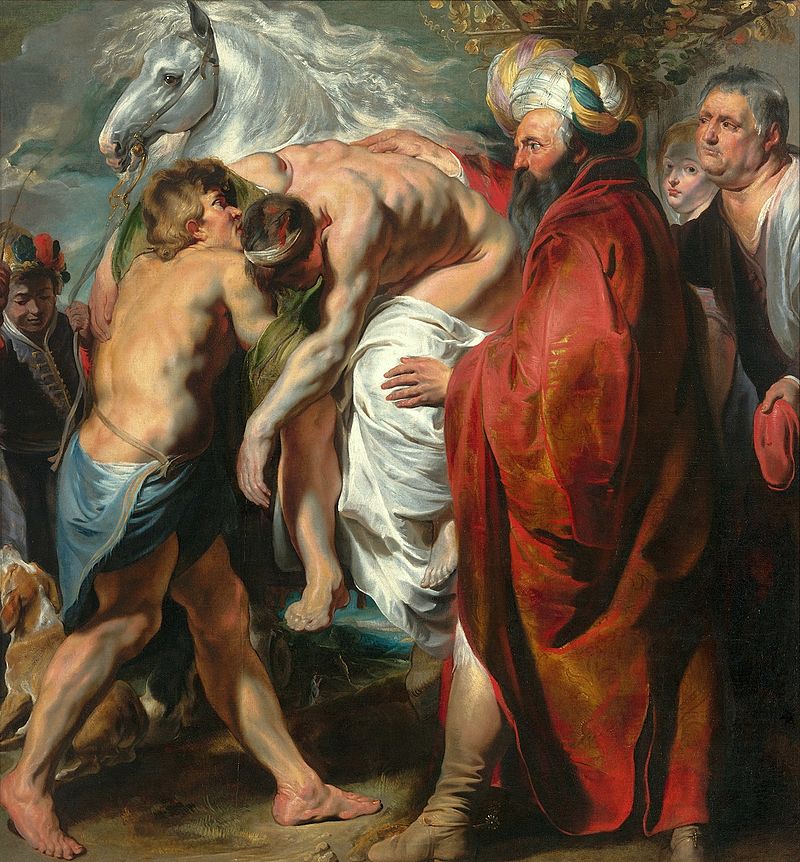
One of the most famous stories in the Bible didn’t actually happen—it’s a parable—but like all of Jesus’ teaching, it shows remarkable insight into the way people think. And it reminds us that not much about us has changed since he walked the earth. There is, indeed, nothing new under the sun.
I’m speaking of the parable of the Good Samaritan. We all know the story.
There’s a man walking from Jerusalem to Jericho. That’s about 14 miles as the crow flies (and pedestrians don’t), down a steep and winding road through rugged, rocky, outcropped desert—what American Westerners would call Badlands. In the other direction, of course, it’s steeply uphill, a feature that in those days encouraged brigands. You hide behind a rock, and you wait for a lone (foolish) exhausted traveler to struggle pantingly by, and you make short work of him.
And so, where the robber meets the road, someone does that to this guy, leaving him shekel-less and beaten by the side of the road. A profitable day’s work.
And along comes a priest, somebody who really ought to care—but he doesn’t. He leaves the man helpless and dying in mid-desert under a hot sun. In essence, he kills him in his heart by leaving him to what can only be death.
Along comes a Levite, another full-time Jewish worker, another one who Ought to Care. And he doesn’t either.
Then comes the Samaritan.
This story doesn’t hit us the way it would have hit Jesus’ hearers, because we don’t revulse at the word. Maybe we should reset the story in our own culture.
Along comes a radicalized Muslim. A communist-sympathizing BLM agitator. An Antifa rioter.
Nancy Pelosi. Kamala Harris. AOC.
A Democrat.
You know, somebody like that.
And he defies all expectations. He is moved by what he sees, and he acts to help the man, providing first aid, taking him to medical care, paying his costs because he’s a robbery victim and has no means—and then he just leaves, not seeking anything in return.
He’s a friend—from the victim’s perspective, an invisible, anonymous stranger, but a friend.
You may be surprised to learn that my main point today isn’t this convicting story—though there’s plenty here for all of us to be convicted about.
My point, as reflected in the title above, is what happens before Jesus tells the story.
A lawyer—that is, a specialist in the Torah, the Law of Moses—asks Jesus what he needs to do to gain eternal life (Lk 10.25). Jesus says essentially, “What do you think?” The questioner dips into his area of expertise and delivers a perfect summary of the Mosaic Law—in fact, the same summary that Jesus Himself delivers elsewhere: love God, and love your neighbor (Mt 22.34-40). Jesus says, “You’re right; do that.”
And then the man, the lawyer, looks for a loophole: “Um, just how, exactly, would you define the word neighbor?” It depends, you see, on what the meaning of the word is is.
And now Jesus tells the story.
And he chooses as the protagonist precisely the person that every one of his hearers would have said is most certainly not his neighbor.
What’s the point?
Who is my neighbor?
It’s anyone who needs my help.
Anyone.
Most especially the surprising ones. The Others. The enemies.
In 2004 Vermont Governor Howard Dean was a candidate for the Democratic nomination for president. At a campaign event a voter chided Dean for speaking so harshly about his neighbor, President Bush. Dean replied, “George Bush is not my neighbor,” thereby nicely illustrating the very human tendency Jesus was combating with the parable.
We’re all for ethics, all for kindness, all for grace, when we’re the potential victim. But when grace is called for from us, we want to live by the loopholes. In this instance, you see, it’s different.
No. It’s not.
How different would our world be today, do you suppose, if Christ’s ambassadors represented him with the kind of grace that surprises and shocks precisely those who hate them? What if the behavior of Christians was actually … surprising? What if it didn’t look precisely like the behavior of everyone else on the battlefield?
What if?
Photo credit: The Good Samaritan, by Jacob Jordaens, c. 1616 – si.wsj.net, Public Domain, https://commons.wikimedia.org/w/index.php?curid=19655930

Leave a reply. Keep it clean.